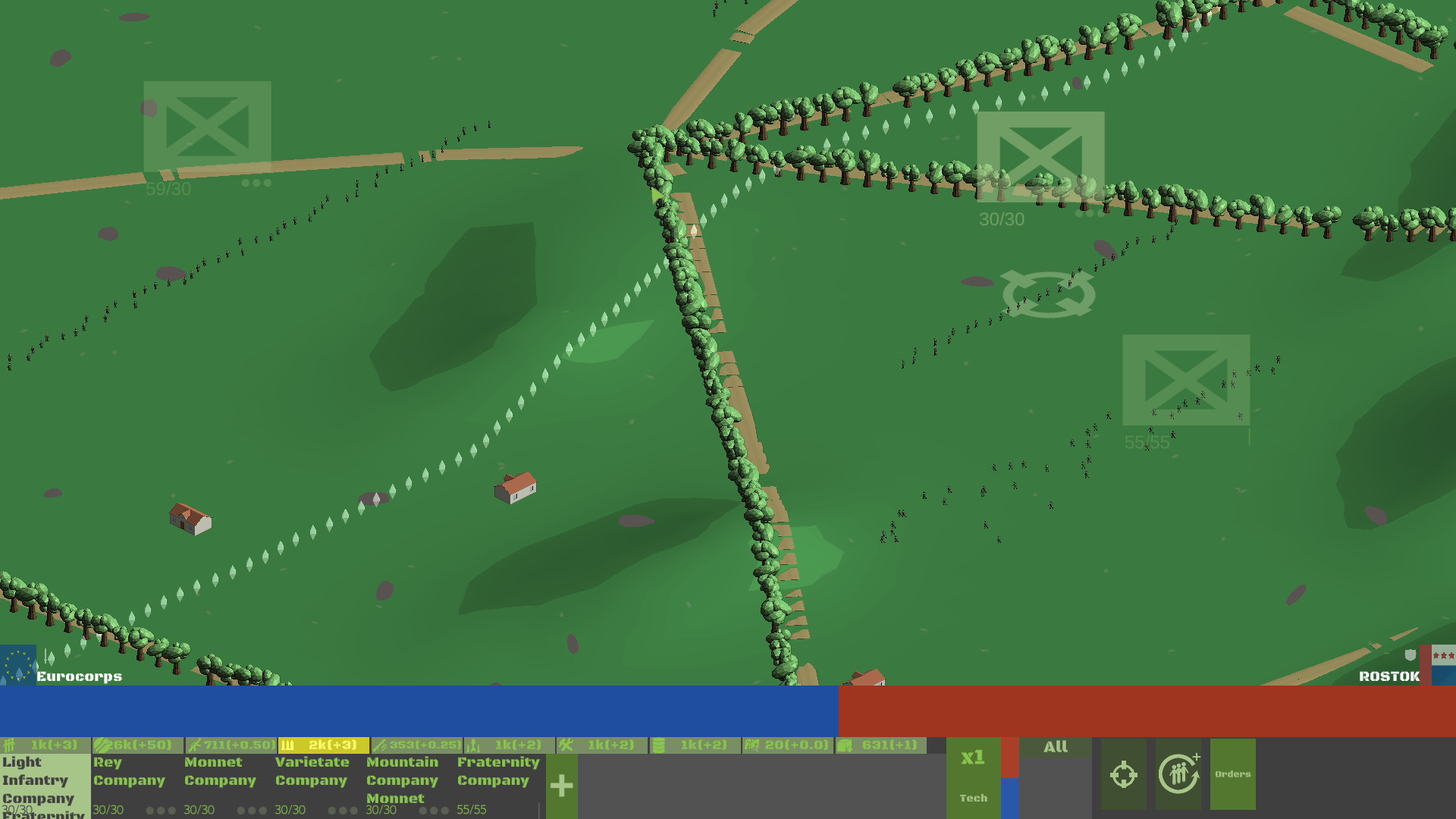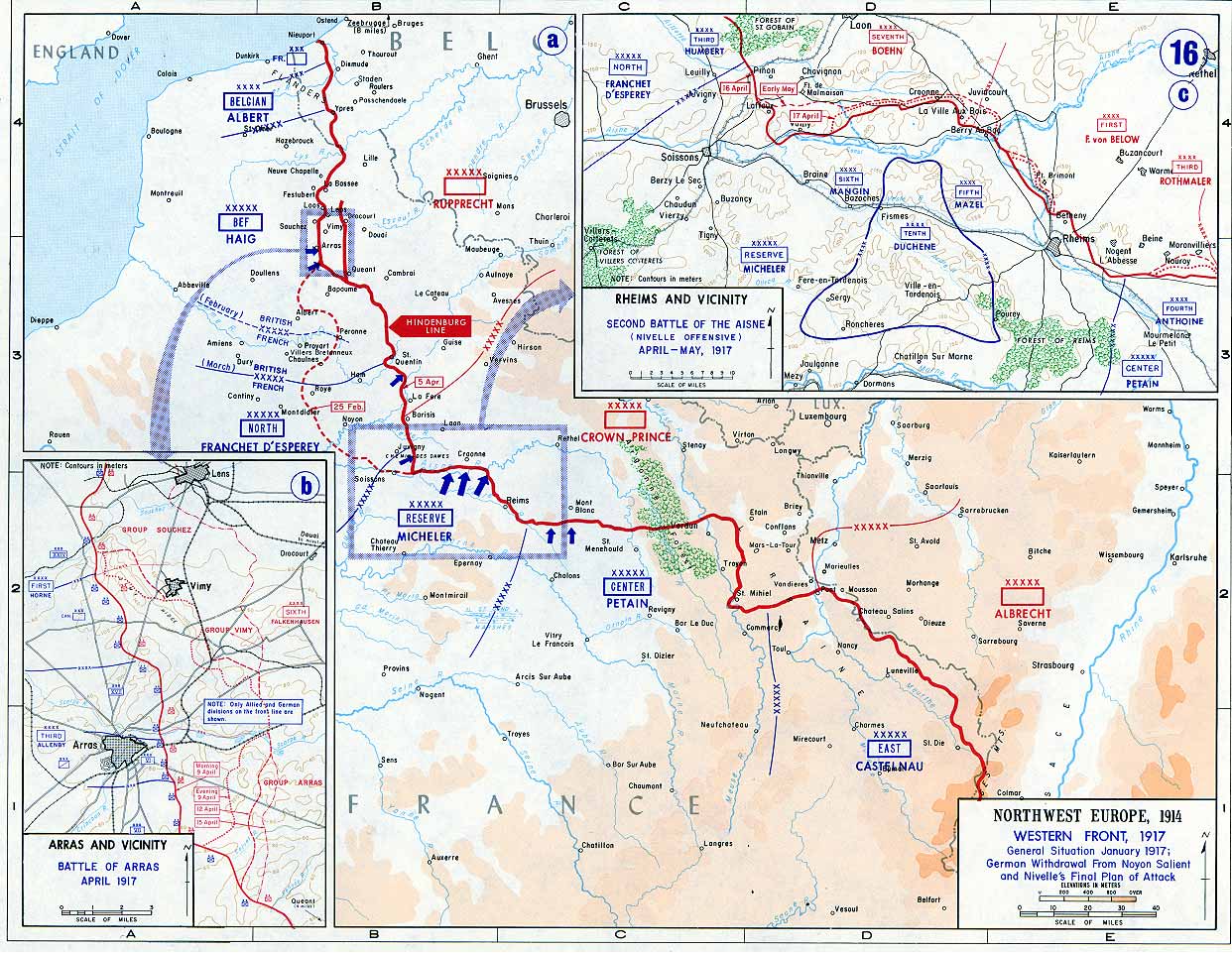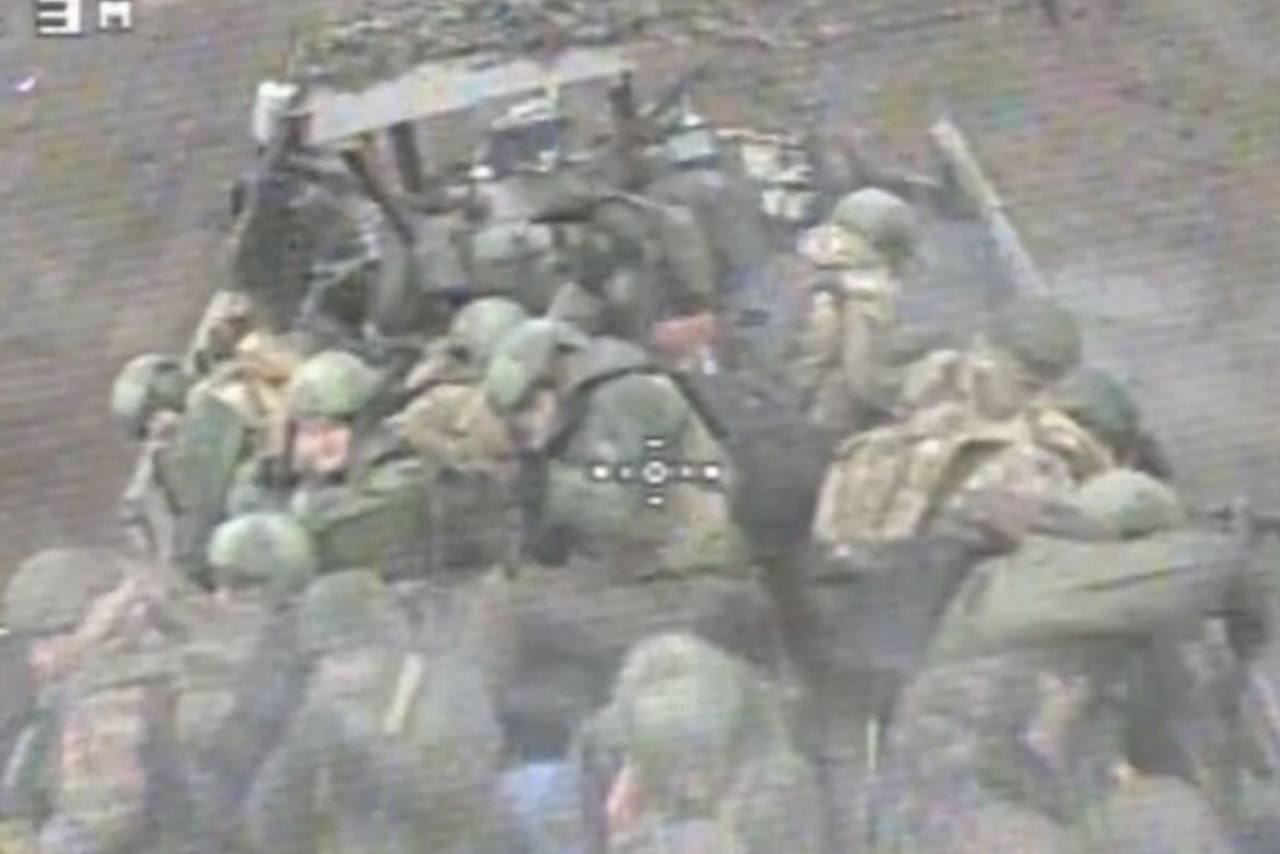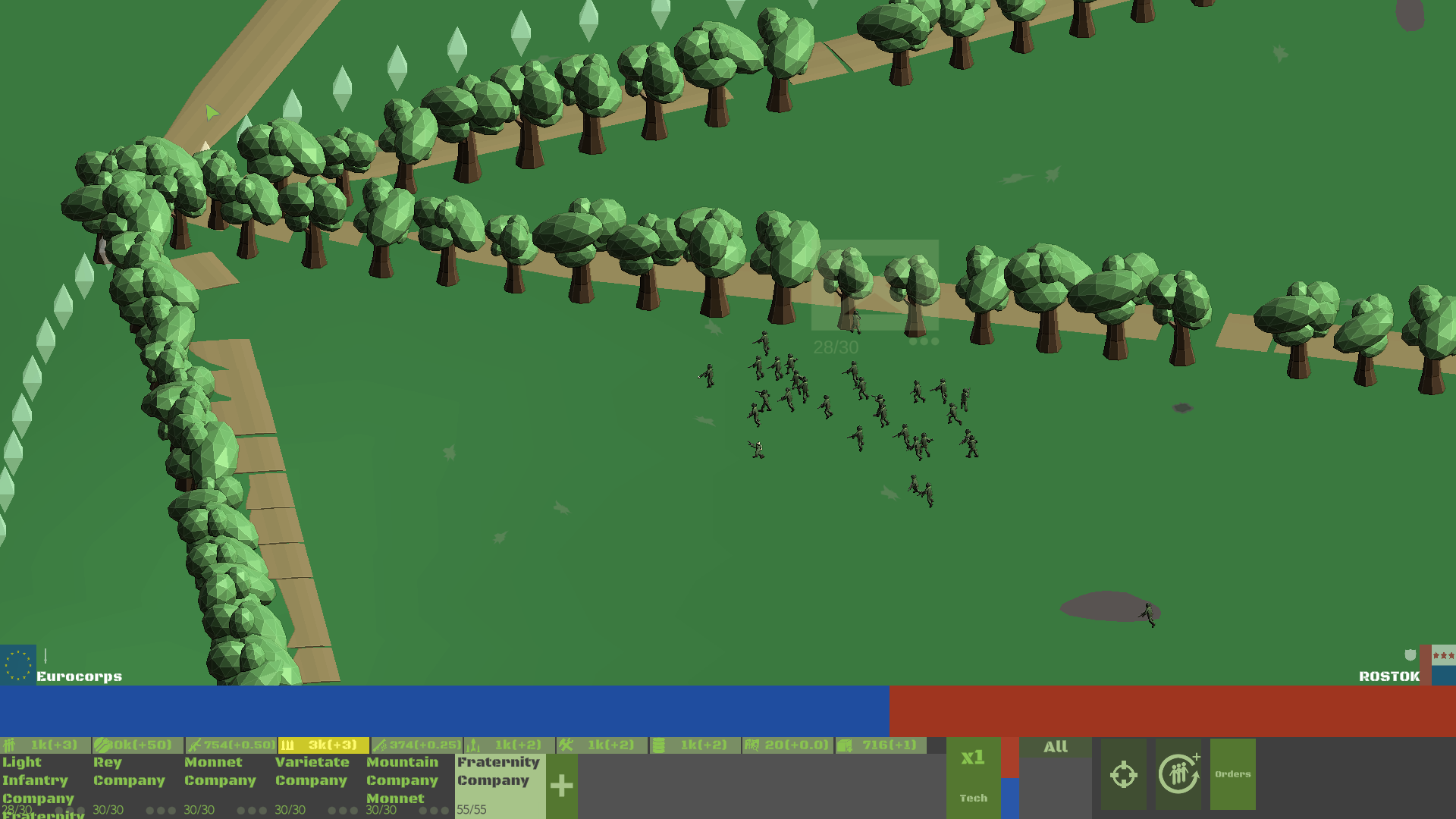Six months in - yet another "new" project

We all have these ideas that stick in our minds for years.
Somehow, these ideas never turn into the concrete games or the other creations we had in mind. Most of the time, they never exit the prototype stage. Often, we abandon these ideas for yet another sexy side project and we toss away weeks or even months worth of work to get on board a new adventure inspiration brings us. Beautiful somehow but sad on the long run as one never finishes anything without a minimum of constraint and discipline.
But in the end, these ideas always come back. A book we read, a movie we watch, a news article or simply a conversation will remind us about this game idea we had and how kickass it was (in theory). And inspiration knocks again at our door and it revives the project. I had this very thing happening to me. I had for a long time this wargame project that I "started" multiple times in my life, only to move on to something else after a few weeks.
But the idea came back. This time I went far enough to have some sort of virtuous circle on the progress made. Now I am sure that this project will lead me somewhere. What is specific about this strategy game idea is the two following game mechanics: a moving frontline and morally questionable sides fighting each other.
A frontline that moves as the battle progresses
If you check history books or watch TV news about current conflicts, you will often see this visual representation of a frontline, dividing a territory between a blue and a red faction. I have always found these representations to translate infinitely good into the game design of a wargame.

If one send some units on an attack and they make some progress: it means the frontline moves forward and you gain control of what is now in front of it. If, on the contrary, the enemy is sending an attack on one of the weak points of your frontline and you are losing ground, well, the line moves back, telling you you are losing what is behind this line.
I always had this idea of units in a strategy game influencing the shape of a visual line representing a frontline by moving it forward the closer they are to it. This visual frontline would move, forward or backward as the battle progresses.
And the goal of the game would be to push this frontline to the end of the map. Make this line touch the border of the map and you win, like a rugby player would try to push the scrimmage line forward and ground the ball behind the scoring line.
Because you are controlling it, your reinforcements could be deployed within the area in front of this line, appearing from the border of the map. This would create this interesting balance in which a faction defending the last controlled meters would have a short distance to cover for the reinforcements to reach the frontline and in which a faction close to victory would have to wait before its reinforcements catch up with the frontline moving forward.
Grey on grey actions
Good story telling is not about truth
Dumbing down a story makes it easier to tell it, but this does not make it a better story.
You see that a lot in Hollywood movies, and to a certain point, in modern book writing. It is amazing how the dumb stories you can find some Marvel movies from the last decades will still attract so many viewers: it is because those stories may be dumb, but they are well told. You can even find very niche/nerdy stories like the one in Dune's complex science fiction universe receiving this treatment for the sake of enabling a better understanding for the masses.
In the last Dune movie, where is Thufir Hawat? Why is Chani angry like a teenager because Paul, the love of her life, secured his throne through a political marriage which will stay unconsummated? Where are the dreams and visions that both Paul and his Fremen kin share because of the omnipresence of the spice in the winds of Arrakis? Where are the complex politics within the Landsraad? The perversion of the Harkonnen and their elaborated plots? All of this is gone in the movie, because you then get a story which is way easier to be told and can be translated into a decent screenplay and into good movie direction. And this is exactly the case with Dune.
The movie is amazing if you compare it to other movies and you should definitely watch it. But it is outrageous if you watch it as a fan of the original books. It does not translate the fascinating complexity and vastness of Dune's universe. You can sum up its story to this Paul/Fremen (good) vs Emperor/Harkonnen (bad) dichotomy. Sad isn't it?
You can see the same in Harry Potter with this Harry/Gryffindor/Muggles (good) vs Voldemort/Slytherin (bad). Thor vs Loki in Marvel movies, Neo/Trinity vs Agent Smith/Cypher in The Matrix and so on, and so on... What actually makes these stories dumb in some way? Well, this good vs bad confrontation, of course. Nothing is that way in the real world, especially in chaotic times. But it is a story easier to be told.
The first casualty of war
Ukrainians often forget that back at the start of the invasion of their country in 2022, it was still not clear to a typical western eye where the evil lay. Lots of rumours of extreme right factions in the Dombass, a not-so-clear revolution which overthrown a pro-russian government, an enduring reputation as a country riddled with corruption and, above all, an incredible lack of understanding of Eastern Europe and its dynamics. Were these facts caused by the effectiveness of russian propaganda? It definitely was for a part of it. The first days of the war, the shock was there but the surprise was in the end not that big, given this picture the West had from the Ukraine/Russia relationship. "Yet another mess in eastern Europe.", people would say, shrugging.

But then, our dumbing down of the story arrived during the few days after the invasion. The videos of Kalibr missiles falling blindly on cities came, the desperate speeches of Ukrainians and the courage and dignity of their president crying "I do not need a lift, I need ammo!". Then there was Snake Island. Then Bucha. And the Mariupol theatre. It showed us more clearly who the aggressors were.
This is relatable to the previous "dumbing down a story" mechanism that I told you earlier. We suddently stood before this cold fact that the view of this conflict has been dumbed down by the russian regime, which wanted to tell its own story, justifying its invasion. Then we needed the story to be dumbed down again to understand who was invading its neighbours and who was not. In a conflict in which who is right and who is wrong is quite clear, the truth was, in fact, still not clear to a 100% at the beginning.
So what about even more complex conflicts? Conflicts that lasted for decades or even centuries? Conflicts that caused ten times more death and suffering? Conflicts in which one retaliate ten times harder to an aggression? In which two cruel regimes slaughters each other's innocent population? How could we know if a war was started on lies? How could we know which side we should support to avoid other tragedies happening in the world? Even the Allies could barely believe the reports from the polish resistance, coming directly from inside Auschwitz. Everything is summed up by this famous apocryphal quote:
"The first casualty when war comes is truth"
Hiram W Johnson

Those who know what this image means, know the horror of war
And this is the whole point of such a game idea that I had, the whole message behind it. Something is rarely completely black or white before a war really delivers its truth. It is often greys fighting greys before the end of it (and sometimes even after it), hence the name of this project. I wanted to remind us that real truth is almost impossible to find in time of war, only horror stays unquestionable. I wanted a game in which being on the right or wrong side of a conflict is a question of strategy. In which the opinion of the world audience could be molded to give you advantages or hinder your enemy. In which truth is to be played with or fought for. In which the cruelty, the bestiality, the chaos and horror of war is not dumbed down like in a cheap hollywod movie.
So basically, a strategy game in which your troops will randomly carry out war crimes just like in any war and a game in which your opposing faction could document and publish those war crimes in order to show the world that, indeed, they are the one fighting evil itself. The better a faction would prove their morality compared to the other faction, the more resources this faction would receive from the international community to carry out their fight and train more units.
Prototyping the idea
If you reached this far in this post, you understood that what kickstarted my idea again was the tragic invasion of Ukraine. It was two years ago and like a lot of people I was stunned to see an european country, our neighbours, our brothers, suddently going through a full scale invasion. A scene I never thought I'd see in my life.
It is only after a few months following the combat footage on specialized boards that I actually opened Unity again and started this project. Never a conflict was being that well documented regarding the strategic moves or the grim details of what war is. My idea of "grey factions" was represented by the hundreds of drone videos showing soldiers mercilessly being blown off.
My game mechanic idea of a moving frontline was being played in front of my very eyes with the race to Kyiv and the retreat from Kharkiv. I started to develop a prototype of a strategy game with this mechanic, with a resource generation mechanism based on the public opinion for your faction.
Then on October the 7th in 2023, other horrific videos and pictures from Israel started to flood online boards. I was shocked and disgusted by humanity yet again. Yet another violent and brutal conflict started on our planet. The retaliation from Israel was strong. Way too strong for a lot of people. Two sides of a story confronted each other online and on the battlefield, without any mercy. I realized that this was a way more complex conflict regarding truth but through a thicker fog of war, we could still see that the horror was there. The "grey on grey" mechanic would be in my project and my prototype even more important.
For the last six months, I have been working on this game idea. Game development used to be my trade but it is now a hobby only. My priority regarding my programming time is my actual job. The pace I have on this project is as a consequence quite slow, but it has never been that much constant for a game project of mine.

The prototype is working but not fun yet. But I am convinced by the concept that I have in mind: these game mechanics can work, I am sure I am stepping into an interesting unexplored territory. I am not doing yet another platformer. Surprisingly there are not many strategy games playing with this concept of frontline or frontier. Company of Heroes? You are controlling already designated static areas by capturing a classic checkpoint. Battlefield? You are just capturing spawn points. The Settlers? Populous? The fact that a defense tower generates a frontier and an area you are controlling around it makes the whole thing static and centered around these game entities only. Rise of Nations or Civilization? The same but towers and forts are replaced by cities. I couldn't really find a game which had this concept of troops controlling a frontier or a frontline, at least like I had it in mind.
We'll see what working on this prototype will soon bring but I am sure I can make a fun and meaningful game out of it. This is the goal of the next version of this prototype. Stay tuned!
Grey on Grey
| Status | In development |
| Author | thomasgainant |
| Genre | Strategy |
More posts
- 2024.04May 13, 2024
Leave a comment
Log in with itch.io to leave a comment.